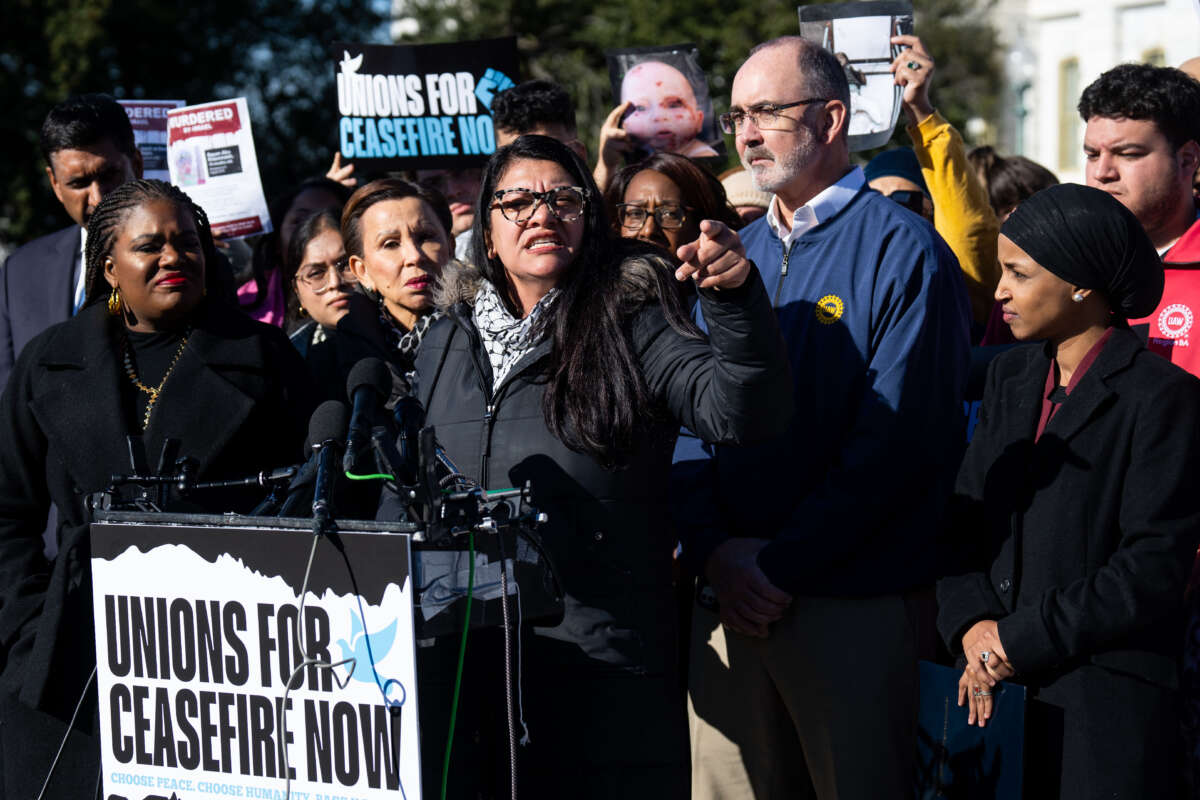Truthout is an indispensable resource for activists, movement leaders and workers everywhere. Please make this work possible with a quick donation.
U.S. lawmakers said Thursday that the Biden administration’s barrage of airstrikes in Yemen — launched in coordination with American allies but without congressional approval — was blatantly unconstitutional and dangerous, heightening the risk of a full-blown regional conflict.
“This is illegal and violates Article I of the Constitution,” U.S. Rep. Cori Bush (D-Mo.) wrote on social media following the strikes. “The people do not want more of our taxpayer dollars going to endless war and the killing of civilians. Stop the bombing and do better by us.”
The Biden administration said the airstrikes, which it characterized as a response to Houthi attacks on commercial shipping vessels in the Red Sea, hit more than 60 targets in Yemen. Administration officials reportedly briefed congressional leaders on its plans to bomb Yemen, but there was no formal authorization from lawmakers.
“This is an unacceptable violation of the Constitution,” said Rep. Pramila Jayapal (D-Wash.), chair of the Congressional Progressive Caucus. “Article 1 requires that military action be authorized by Congress.”
Rep. Rashida Tlaib (D-Mich.) echoed Jayapal, writing that U.S. President Joe Biden is “violating Article I of the Constitution by carrying out airstrikes in Yemen without congressional approval.”
“The American people are tired of endless war,” Tlaib added.
Article I of the Constitution states that Congress has the power to “declare war,” and the War Powers Resolution (WPR) of 1973 seeks to constrain the president’s ability to take unilateral military action. As Brian Egan and Tess Bridgeman have explained, the War Powers Resolution “does not authorize the president to use force,” calling the belief that it does “a common misperception.”
“It takes a limited view of the president’s authority to introduce U.S. armed forces into such situations in the absence of congressional authorization or an attack on the United States,” Egan and Bridgeman noted.
The WPR states that, within 48 hours of a military action, the president must deliver a report to Congress explaining the rationale and legal authority under which such an action was launched. The statute clarifies that the president can only take military action under three circumstances: “(1) a declaration of war, (2) specific statutory authorization, or (3) a national emergency created by attack upon the United States, its territories or possessions, or its armed forces.”
In a statement, U.S. President Joe Biden called the Yemen strikes “defensive,” signaling the administration’s intention to invoke Article II of the Constitution as its legal foundation for Thursday’s bombing campaign. Article II designates the president as commander-in-chief of the U.S. armed forces, and it has been used by multiple administrations as a blank check for military action.
Yemen’s Houthis have been targeting ships in the Red Sea since October, when Israel launched its devastating assault on the Gaza Strip in response to a deadly Hamas-led attack. The Houthis say they are acting to prevent genocide by blockading ships headed for Israel.
The U.S. and allied nations have been working to repel Houthi attacks on commercial vessels since October, shooting down Houthi drones and missiles and sinking Houthi ships in the Red Sea.
The White House said Thursday that Houthi attacks on commercial shipping have had “very little” impact on the U.S. economy.
The US has been engaged in hostilities in the Red Sea with the Houthis since mid-October.
— Brian Finucane (@BCFinucane) January 12, 2024
The War Powers Resolution’s 60-day clock already ran out.
This is not a one-off strike, but instead a further attack in an ongoing conflict unauthorized by Congress. https://t.co/qHHFG2tOeF
Stephen Miles, the president of Win Without War, called the U.S. strikes on Yemen “deeply troubling,” arguing that “it’s an action clearly at odds with both the Constitution and the War Powers Resolution.”
“Congressional authorization isn’t some sort of courtesy, it’s a legal requirement for this kind of act,” Miles wrote. “And since we’re all about to hear a whole lot about ‘self-defense’ let’s be very clear. Under the WPR, presidents are required to seek authorization before knowingly introducing U.S. forces into where combat may become imminent. It was written expressly for situations like this.”
A terrifying moment. We appeal for your support.
In the last weeks, we have witnessed an authoritarian assault on communities in Minnesota and across the nation.
The need for truthful, grassroots reporting is urgent at this cataclysmic historical moment. Yet, Trump-aligned billionaires and other allies have taken over many legacy media outlets — the culmination of a decades-long campaign to place control of the narrative into the hands of the political right.
We refuse to let Trump’s blatant propaganda machine go unchecked. Untethered to corporate ownership or advertisers, Truthout remains fearless in our reporting and our determination to use journalism as a tool for justice.
But we need your help just to fund our basic expenses. Over 80 percent of Truthout’s funding comes from small individual donations from our community of readers, and over a third of our total budget is supported by recurring monthly donors.
Truthout has launched a fundraiser to add 340 new monthly donors in the next 5 days. Whether you can make a small monthly donation or a larger one-time gift, Truthout only works with your support.
